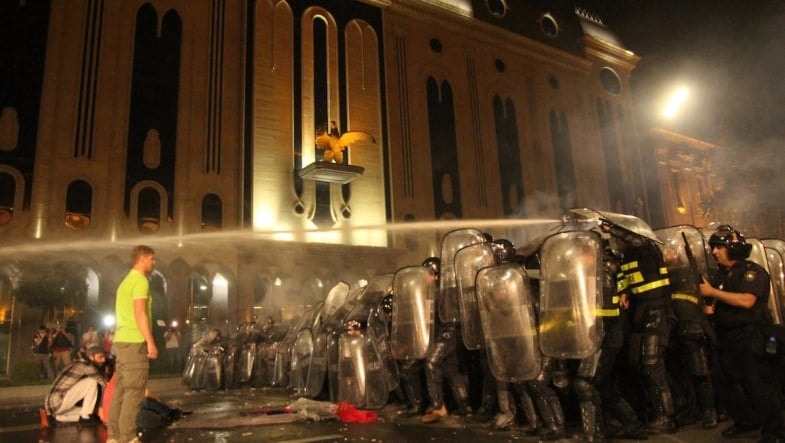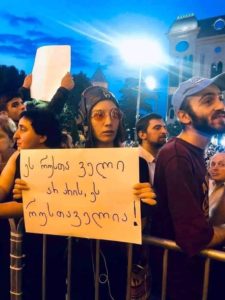Minds of the Movement
An ICNC blog on the people and power of civil resistance
by Giorgi MeladzeNovember 18, 2019
Last week, protests resurged in the Republic of Georgia when Bidzina Ivanishvili, leader of the ruling Georgian Dream party, failed to pass election reform ahead of the 2020 parliamentary elections. The party had promised this concession to pro-democracy protesters last summer, following political controversy that ushered in a new era of Georgian history.
On June 20, a visiting Russian politician was allowed to address the Georgian parliament—in Russian, from the speaker’s chair. The incident stirred immediate debate. Relations between the two countries have been tense ever since a month-long war fought just over a decade ago. More recently, many Georgians have perceived their government as increasingly autocratic and dispassionate.
At the outset of the disturbing incident in June, a few members of parliament registered their protest. Before the day’s end, thousands of business people, academics, students, activists from across the political spectrum, and ordinary people descended into the streets. Their goals are to expose Georgia’s increasingly authoritarian government and demand more democratic institutions, including free and fair elections.
This summer’s protests were met with violence from the Georgian government and several demonstrators were injured. In the days that followed, television reports showed anti-demonstration squads shooting activists, spurring even larger protests that soon crystallized into a well-organized nonviolent campaign.

Source: 20 ივნისი Facebook page.
The 93-Day Campaign
The street demonstrations that took place in Georgia this summer lasted for an unprecedented 93 days, even with government attempts to infiltrate the movement and disturb the peaceful actions. For 93 days, activists gathered on Rustaveli Avenue, where they kept stage and held public discussion. This “93-Day Campaign” came to be funded entirely by voluntary contributions of individual supporters—a virtually unprecedented effort of its kind in the country.
Over the course of a few weeks, the public discussions transformed into a daily talk show, shared live on Facebook. At peak moments, the Facebook livestream had more than 10,000 live viewers. The episodes were also cataloged and shared on social media by the thousands. As the government shut down TV Rustavi 2—a critical channel for monitoring political happenings in Georgia—this street talk show continued to cover major events, adding to its popularity among opposition supporters.
Late summer, activists called for a mass gathering to culminate their 93 days of protest and announced a manifesto titled “GenGegma” (which means “Major Plan” and is a play on a popular song recently released by the Georgian electronic music group KayaKata). The major messages of the manifesto included:
- Building a countrywide network of activists
- Organizing online actions to counter trolls and fake news
- Raising awareness about the 2020 election campaign
- Providing legal support to victims of police violence.
___
Although the movement is still in its early stages, it's never too early to evoke some key strategic considerations.

Source: 20 ივნისი Facebook page.
Define rules for engaging with the movement.
Corruption and undemocratic institutions are commonplace in the public sphere in Georgia. Movement actors can mitigate the risk of undemocratic practices bleeding into their processes by:
- Publicly denouncing undemocratic ways of operating
- Maintaining open communication
- Requiring that all groups wishing to cooperate and support the movement sign a contract with clearly outlined rules for engagement.
Analyze the advantages and disadvantages of taking the movement off the streets and into institutionalized politics.
It takes money and human resources to establish local offices, fundraise, and engage in other activities that are required for entering politics. Yet with the 2020 election campaign unfolding in Georgia at this time of political turmoil, the movement may consider the strategic value of taking the rage off the streets and into formal politics.
As civil resistance researcher and scholar Jonathan Pinckney argues, “Democracy is most likely when activists can keep their social bases mobilized for positive political change while directing that mobilization toward building new political institutions.” However, he also points out that context matters, so movements should be ready to collectively reflect on their own political, social, economic, cultural, and other contexts before taking action.
This question aside, one thing is certain: successful pro-democracy movements do not wait until the last minute to begin planning for what the post-election period will look like. They treat it as part of ongoing movement work.
Secure offline spaces for the movement to thrive in.
Will it be effective for the pro-democracy movement in Georgia to continue organizing organically via informal networks, largely online? In the era of internet, is it necessary to organize offline spaces for movements to grow in order for political change to happen?
My answer would be yes, and it is doable if local NGOs and community leaders are willing to cooperate. Physical spaces are necessary because no movement can exist without supporters. Spaces allow to people to gather, host activists visiting from other regions, organize trainings, host public speaking events… Whether through grassroots movement work or in the guise of a political party, political change is a complex process and needs independent physical space to grow and bear fruit.
Create expectations among activists that movement work is hard and steady.
The street actions that the 93-Day Campaign organized should be seen as only the tip of the iceberg. For a movement to stay alive, activists must regularly devote time and effort into strategic and tactical planning.
The regularity of planning sessions is key, because civic action is not a linear process and unexpected realities occur frequently. For example, the government will try to disrupt the movement by sending in agents provocateurs, feeding false information to media outlets and the public, and attempting to discredit movement leaders and members. Should this happen, the movement should be able to regroup and nimbly change course.
Yet there’s more to this. Democratic groups have the unique challenge of absorbing diverse ideas and initiatives and creating an inclusive atmosphere from this mosaic. Steady movement work like frequent gatherings can serve as fora for activists to voice their opinions and listen to others—the very foundations of a democratic process.
Maintain the upper hand in public debate.
Public debate in Georgia right now is electric and frequently explodes into immature exchanges of “fighting words.” Government-associated media groups fuel the conflict and maintain this pattern by exploiting sponsored Facebook pages and trolls.
Despite their recurrence in Georgia, using fighting words in public debate is particularly harmful to movements. How can the movement maintain the upper hand in public debate? By refusing to “take the bait” and by sticking to the movement message: its vision for a future Georgia with strong democratic institutions. A forward-looking communications strategy will help activists build alliances, expand the movement, and possibly even secure defections from within the government.
As Georgian activists have gained significant experience in planning, organizing, creative resistance, fundraising, and other critical components of movement success, a nationwide popular movement seems like a realistic endeavor.
Yet, we must also be wary of the Georgian government’s efforts at political consolidation and coalition building before the next elections.
To keep an upper hand, now is the time for the pro-democracy movement to recruit, train, and employ more Georgian activists for the cause of democracy and transparency in government. Numbers matter in the pursuit of a movement strong and independent enough to rewrite the course of Georgian history—and to get numbers, we must get organized.

Giorgi Meladze
Giorgi Meladze is Associate Professor at Ilia State University School of Law in Tbilisi, Georgia. He is a former member of the KMARA movement, a civic youth movement against Shevardnadze’s rule in the early 2000s. He has extensive experience in training grassroots groups and human rights activists locally and internationally. Currently he is one of the organizers of the ჯიუტი/GEUT (“Stubborn Resistance”) movement in Georgia.
Read More